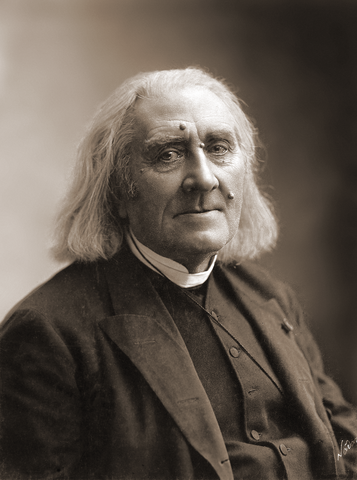HOME
> PIANO WORKS
> F.Liszt

Franz Liszt
1811-1886
Born in Riding (now Burgenland, Austria). He began learning to play the piano around the age of seven, but his talent quickly developed and by the age of nine he was giving concerts. He left Hungary to study performance and composition and worked throughout Europe, including Vienna, Paris, England, and Italy. Along with his active compositional activities, Liszt honed his piano skills and became famous throughout Europe as a virtuoso. Here is “Liszt surrounded by enthusiastic female fans” that we are familiar with.
When he was in his late 30s, Liszt, who was exhausted after years of touring around the country, retired from performing, conducted the court orchestra, and began a life of energetically presenting his own orchestral and piano pieces. His piano works written around this time include 《Three Dreams of Love (Liebesträume)》 and 《The Transcendental Etudes. 》
In the 1960s, Liszt decided to stay in Rome, where he became deeply religious and became a monk. Due to this influence, he ended up composing many religious works. This is also “List with strong religious overtones” that we are familiar with.
Liszt continued to be active in music in his later years, teaching piano and composing music, but he died of pneumonia in Bayreuth in 1886.
No matter how many words I write about, I would not be able to write about his achievements in music history, his works, or even about his personal experiences as a human being. If we focus on his piano works, the first thing that comes to mind is the common image of “a person composing extraordinary technique works.”
Liszt, who himself had excellent piano skills, was able to write music for himself. He also uses a wide range of expressions, including not only difficult pieces, but also pieces that are inspired by literary works, pieces that incorporate new techniques, and pieces that are influenced by gypsy music. He is also very good at creating beautiful melodies, and is a natural melody maker, which is probably why he is a great composer.
In addition, in his later years, Liszt actively incorporated diatonic scales and dissonance, and even composed a piano piece 《Bagatelle without tonality S.216a/ R.60c》, which he himself described as “aiming for atonality.” Even in his later years, he is stepping forward into the next era. (This work is said to be the first musical work that advocated “atonality.” )
Liszt himself was active as a virtuoso, left behind numerous works as a composer, participated in music festivals all over the country, and passionately taught piano to many disciples, sending them out into the world. His activities continued unabated until just before his death. He is a man who lived his entire life as a truly musician.
Personally, he is one of those composers whose overwhelming beauty of the sounds he uses, rather than his transcendental technique, is what makes me fall in love with him. I hear people say that they don’t like the feeling that he is aiming at the audience, and that they avoids her glamor and popular appeal, but beautiful things are beautiful, so I personally have no problem even if he is aiming at the audience. It’s not always true that personality and humanity will come out in works. I think it’s perfectly fine for someone who has a terrible personality and is hated by everyone around them to create beautiful music that captivates people.
The magnificent sound that utilizes every possible sound that can be produced by the piano is also pleasant. I think Liszt is a person who understands the piano very well.
Although it’s gorgeous, I think it’s good that it’s not overwhelmingly bright… Liszt was deeply religious, becoming a monk in his later years, but in his private life he was fond of women and had constant lovers and mistresses, causing scandals. He has both the sacred and the profane (!?), and I think he is very human-like.
He is a composer who (secretly) has a lot of works he wants to play, but the works of Liszt are very difficult to play and need to practice hard.
|Piano works
- Christmas Tree S.186 / R.71
- Bagatelle without tonality S.216a/ R.60c
|Piano duo
|Piano textbook・Etude
|Reference・score・web site
〈reference〉
〈score〉
〈web site〉